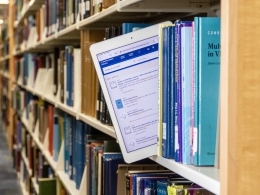
“The Library is closed.” This phrase is echoed among university library websites across the nation, yet does little to explain the dynamically shifting roles in which library staff and faculty find themselves.
While the physical University Library space is closed, its services are most certainly not, and Library staff continue to find innovative ways to support UCSB students and faculty.
Due to the onset of the global COVID-19 pandemic, classes and research evolved rapidly from in-person to remote learning, which required reliable digital platforms and access to digitized information.
The University Library has been hard at work enhancing and discovering new ways to provide these digital services, supporting student and faculty needs by maintaining databases, offering virtual instruction assistance, securing access to digital materials, ramping up online course reserves, and much more.
The effects of these efforts have already been realized in the few months since UCSB’s campus closed, proving their value to both individual students, communities at large, and even current events.
Expanding Access to Copyrighted Material via HathiTrust
Leah Norris, a UCSB English graduate student whose research was interrupted by the pandemic, needed to access a 1982 publication titled The Womb of Space, which sits behind locked doors in the University Library stacks.
“That date is problematic,” English Literature Librarian Jane Faulkner explained, “just old enough that the book doesn't exist electronically through either the publisher or any of our vendors, so I assumed we were out of luck.”
Faulkner searched “high and low” to find another copy of the book for Leah with no success until she remembered UCSB’s access to a service called the HathiTrust Digital Library. UC co-founded HathiTrust in 2008, creating a collaborative repository of digital content from various participating academic and research institutions.
These institutions periodically contribute scanned copies of books and journals, allowing online access to what has now reached nearly 13 million digital volumes. And, with the newly initiated Emergency Temporary Access Service (ETAS), UC researchers have expanded access to even more copyrighted material during the pandemic.
Sure enough, Faulkner was able to find access to The Womb of Space for Leah through the organization.
“The HathiTrust ETAS has been a lifesaver for faculty and grads,” Faulkner claimed. “It's allowing us to access, electronically, those physical books that wait quietly in the library while we're locked out of the building.”
Collaborating to Give Database Access to Chinese Researchers
UCSB’s library-supported services have even crossed international borders to support students and researchers abroad.
Yao Chen, UCSB’s East Asian Studies Librarian, spearheaded an initiative with the help of Columbia University’s Chinese Studies Librarian Chengzhi Wang to provide temporary free access to over 160 electronic databases in the Greater China Area, intended to last until June 2020 with potential for extension. The initiative assembled a detailed list of available databases to help Chinese scholars locate valuable and relevant resources for their work, easing the difficulty of remote research.
“Our effort received overwhelmingly positive feedback from our Chinese and East Asian librarian colleagues,” said Chen, including those from Harvard, Stanford, Michigan, University of Toronto, University of British Columbia, UCLA, University of Washington, Smithsonian Libraries, Oberlin College, Elling Eide Center, NYU, San Diego State, and Macalester College.
“This timely and comprehensive list of databases has greatly benefitted overseas Chinese scholars and students in coping with the sudden switch to remote instruction due to Covid-19.”
Providing the Community with Timely Resources
UCSB librarians are aware that the Library, in both its digital and physical forms, acts as a core piece of the community. As such, the Library remains actively involved in current events--even when its doors are closed--ensuring that timely and appropriate resources are made available.
When George Floyd, a Black man, was killed by Minneapolis police during arrest, the event sparked Black Lives Matter protests nationwide calling for an end to violence and systemic racism toward black people. The Library saw increased demand for resources on anti-racism and the Black experience in the U.S. and staff worked quickly to purchase ebooks of relevant titles to make them available to read.
Additionally, UCSB's Black Studies librarian, Angela Chikowero, promptly put together a LibGuide of resources on "Race, Racial Relations, and the Black Experience in the U.S." to help students and faculty easily find scholarly information on this subject. Her LibGuide also created opportunities for faculty to collaborate with the Library as they integrate course material surrounding the Black Lives Matter movement into upcoming classes.
The Library recognizes the profound impact digital services can have on community success and seeks to expand these services not only during the pandemic, but indefinitely. Thus, librarians and staff are continuously researching available resources to digitize information and increase permanent access to online services and databases, setting the foundation for future success.


